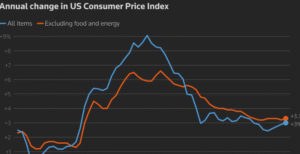$XOM $CVX $BTC
#EnergyPolicy #OilStocks #NaturalGas #CleanEnergy #FossilFuels #ClimateChange #EnergyMarkets #Renewables #Crypto #Investing #USPolitics #EconomicOutlook
The announcement of Chris Wright as the energy secretary nominee under former President Trump’s administration has sparked considerable attention across the energy sector, particularly among investors and market analysts. Wright, a prominent figure within the energy industry and an outspoken skeptic of climate change urgency, has publicly stated that “there is no climate crisis.” This controversial stance has significant implications for the direction of domestic energy policy, potentially affecting both fossil fuel and renewable energy markets. Investors in traditional energy stocks like $XOM (ExxonMobil) and $CVX (Chevron) are monitoring these developments closely, as Wright’s leadership could prioritize oil and gas development over renewable energy initiatives, easing regulatory burdens on the fossil fuel sector. Such a policy shift would likely provide a bullish catalyst for traditional energy companies, but it may simultaneously exacerbate volatility in industries tied to clean energy technologies.
Market participants are also assessing how this policy direction could intersect with broader economic and geopolitical trends. With Wright’s focus on fossil fuels, there may be a push for expanded drilling and exploration in domestic markets, potentially lowering energy costs in the short term while bolstering U.S. energy independence. This could increase the competitiveness of American oil and gas exports on the global stage. However, critics argue that prioritizing fossil fuels over renewables could hinder the U.S.’s ability to compete in the rapidly growing clean energy sector, which has gained momentum internationally. Boom-and-bust cycles traditionally seen in the oil industry could also lead to heightened earnings uncertainty for companies reliant solely on fossil fuel production. Meanwhile, renewable energy companies and green infrastructure stocks might see headwinds emerge if federal subsidies or incentives are curtailed under Wright’s administration.
The potential ramifications extend beyond equities, as energy policy also intersects with the cryptocurrency space. Cryptocurrencies like $BTC, which face growing scrutiny over their environmental impacts due to energy-intensive mining processes, may be spared from immediate regulatory crackdowns in an administration less concerned with carbon emissions. This could lead to renewed interest in crypto mining operations within the U.S., particularly for Bitcoin. On the other hand, clean energy initiatives tied to blockchain technologies, such as projects exploring renewable-powered mining solutions, may lose momentum in this policy environment. Crypto investors should weigh these dynamics carefully, particularly given Bitcoin’s sensitivity to energy costs and regulatory trends globally.
Ultimately, Chris Wright’s policy agenda represents a sharp pivot from the renewable-focused initiatives pursued by prior administrations. For investors, this shift underscores the importance of sector-specific strategies. While fossil fuel stocks may experience a near-term rally, reliance on such energy sources carries inherent risks tied to price pressures, environmental regulations, and long-term economic transitions away from carbon-intensive industries. Renewable energy investors, meanwhile, might find opportunities in undervalued assets or companies poised to capitalize on state-level clean energy programs, even as federal policy becomes less supportive. As the market reacts to these developments, energy sector volatility across both equities and alternative asset classes appears inevitable, reflecting the complex intersection of politics, policy, and economics.










Comments are closed.